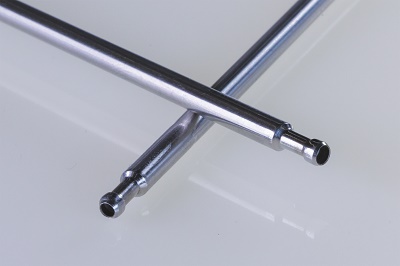
Without modern medical technology it is not possible to provide a reliable standard of care, that helps to cure diseases, and to make that the hygiene standards are maintained. Special solutions for tubes are needed in order to meet these special requirements, like the sophisticated components of medical devices or the correct disposal of waste liquids. Most of these tubes are very fine and thin.
The forming techniques that are usually used in the automotive and industrial sectors are therefore more and more important,. What matters here is to be able to process high- and ultra high-strength materials, such as titanium and stainless steel, that are used as flexible aids in microsurgery. With their t forming machines, the high tech machine manufacturer transfluid make it possible to form tubes with an axial and rolling forming process , with impressive results. For instance, it is possible to execute very accurate symmetrical and asymmetrical axial forming, with a great variety of very specific materials.
Process for tubes with an external diameter between 1.5 and 8mm
“The rolling forming is clearly very important, as it can be applied with great effect”, says Stefanie Flaeper, sales and marketing director at transfluid. “Our rotary forming machine can reduce or form the tubes partially or over a long distance. In both cases the process guarantees an outstanding precision. After all, we are working with tubes with an external diameter between 1.5 and 8mm”. These fine tubes are used in endoscopy, emergency medicine and much more. They also play an important role in the hospital equipment, the care equipment and sterilization processes. As a very special connection technique is required in this case, it may be necessary to use lasers for the cutting during the forming of the tubes.
Alternative forms of lubrication
The manufacturing of formed tubes for medical technology is done in laboratory-like conditions or in „clean rooms“. In order to prevent contamination, the forming machine cannot always use the usual techniques. Therefore, ceramics or special metals with specific coatings are chosen as materials for the tools, to meet those requirements.














